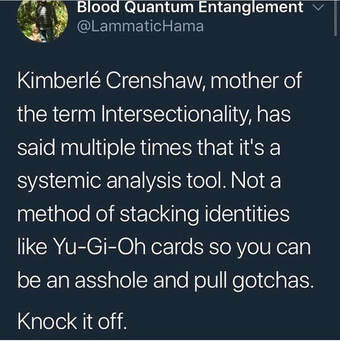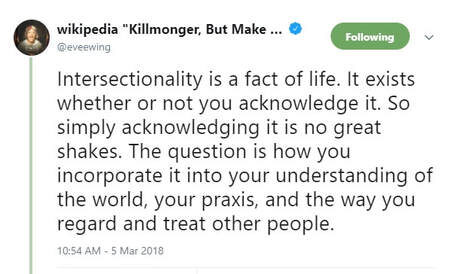Yes, this rant will be snarky and will probably involve profanity.
So there’s a Tweet going around Facebook that reminds us how intersectionality works.

It reads, “Kimberlé Crenshaw, mother of the term Intersectionality, has said multiple times that it’s a systemic analysis tool. Not a method of stacking identities like Yu-Gi-Oh cards so can be an asshole and pull gotchas. Knock it off.” Okay, there’s the profanity. But it’s needed because this shit is enraging. What I’m interested in here is the way that those with privilege use this term as a virtue signal to pull those gotchas that allow them to ignore our experiences.
Since Kimberlé Crenshaw coined the term back in the late 1980s, intersectionality has become a term to speak rather than a tool to use. Using intersectionality as a touchstone, mainstream feminism now tries to take into account the experiences of many different women. Our rhetorical research and pedagogies now acknowledges that culture matters to how we tell stories and that there’s no one way to do it. And that’s good, at times admirable even, but simply using the term as a key is not enough. It is a multidimensional lens that demands we interrogate how unique intersections of identities create new forms of privilege and oppression, because everyone’s identity is intersectional. But until we contend with how construction takes place and how these differences manifest, some experiences will continue to be erased, discounted, ignored.
Saying you’re intersectional in your approach is not necessarily useful. Sometimes it’s silencing and oppressive. That’s because instead of using intersectionality as a critical lens, people use it as a means of lip service to diverse identities as they are conceived by those in power and with privilege: as monolithic, as if they exist in a vacuum and can be checked off like a list of people invited to a party. We’re going to attend to the needs of different marginalized groups, but we’re not going to learn from multiply-marginalized people how to best approach a social problem so we recognize it in all its insidious forms and its influence on other problems. No, that’s too hard, so instead we are going to go from one societal ill to another, one at a time, with the most pressing ones tackled first. And guess who always gets to decide which come first?
So now an illustration as a critique.
I teach at a Hispanic Serving Institution, or HSI, in Houston, Texas. I won’t say which one but I’m sure you can Google it right quick. The school was created to cater primarily to engineers and other folks working at NASA; a lot of the students turned out to be older white women, returning students who were training to be teachers or business majors. The university was a commuter campus for a very long time until a few years ago, when downward expansion means the school started accepting first-year and second-year students. What happened with downward expansion is that the major demographics shifted: instead of the largest group of enrolling students being middle-class white women returning to finish their degrees, it is now working-class Latinas. Hence, why I’m there, because representation matters. But you know what? Representation, when you’re one of only a few people who have it do it, is pretty fucking tiring.
My university has a longstanding interest in women’s and gender studies; one of the first classes they ever offered at the nearby prison where I myself taught was WGST, and the school even hosted Judy Chicago’s Dinner Party. All great things. But, a lot of the work being done at school revolves around white feminism. Around cis womanhood. Around middle-class identity. Despite a change in demographics there is still little to no mention of disability or immigration status, language diversity, race, trans rights. Except in guess who’s classes. That’s right, those directly affected by these problems, the people who don’t have the privilege to NOT think about these things. Those who are already tired from having to deal with these things precisely because those with privilege exert said privilege and try to keep things simple for themselves in learning and life spaces. That’s not to say that programs should attend to diversity ONLY when the numbers reflect it, but at the very least, they should when numbers do. Many of our students work multiple jobs; balance school, work and family responsibilities; have disabilities they can’t afford to see doctors for; and speak English as a second or third language. But these things aren’t necessarily regarded or critiqued as connected in the classroom; they’re just an amalgam of oppressed identities they had the bad luck of getting all at once.
When I have asked colleagues how they discuss race, ethnicity, or immigration status in talking about gender, it becomes aggregative:
“Well, we discuss women’s studies and then there’s a unit on race where we focus exclusively on women of color.”
“But whiteness is a race, too.”
*Blank stare*
“Also, these experiences aren’t fungible. Misogyny targeting Latinas and Black women are very different things. Moya Bailey talks about misogynoir and the way Black women are constantly rendered hypervisible and subsequently exposed to specific kinds of violence. On the other hand, many Latinas of Indigenous ancestry are rendered invisible to cast us as foreigners. And disability and race as constructs are intertwined, which creates an ontological hierarchy that furthers the invisibility/hypervisibility distinction and makes solidarity efforts hard unless were using intersectional critique.”
*Another, longer blank stare as though this person has never had to think about this, though some of us think about it constantly*
The thing is, this person probably never has even though they’ve gone through and added all these identities in like so much garnish. In some cases, I’ve even been told explicitly that that’s what MY classes are for.
“I focus on gender, which is my specialty, so I wouldn’t even know how to teach about race or disability. I’ll just mess it up. They’re better off learning it from you. Anyway, when they attend all of our classes, they’ll get the whole experience.” Because yes, in this case our courses are those Yu-Gi-Oh cards and you gotta collect them all.
By making intersectional critique a matter of programmatic diversity, teachers eschew the responsibility of guiding students in becoming attuned to the uniqueness of diverse experiences. They force the blame onto students for not choosing the right set of courses. They continue to treat aspects of identity as isolated elements, inuring privileged thought. We don’t need more of that. In another popular Tweet Wikipedia Brown says, “Intersectionality is a fact of life. It exists whether or not you acknowledge it. So simply acknowledging it is no great shakes. The question is how you incorporate it into your understanding of the world, your praxis, and the way you regard and treat other people.”

We all have intersectional identities, but we don’t all have to think about all of them all the time. It must be really great to be able to do research that way, to live that way. Nah, not really, because that kind of research and living doesn’t account for the complexity of the world and it certainly doesn’t account for the way many of us know ourselves.